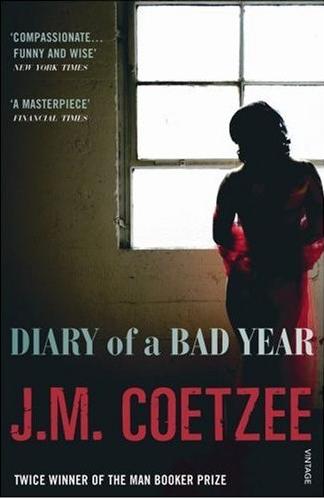J. M. Coetzee — Diary of a Bad Year
August 28, 2008 at 7:36 pm 2 comments
I’m a J. M. Coetzee fan — one of the biggest, probably. But even I have to admit a tinge of frustration with his output since his last conventional novel, Disgrace, appeared in 1999. He’s given us autobiography (Youth), philosophical stories (Elizabeth Costello), essays (Inner Workings) and a metaliterary oddball (Slow Man), but nothing resembling the towering oeuvre of fiction that made him one of the 20th Century’s greatest novelists. So what, then, is his latest book, Diary of a Bad Year? None of the above — again.

Each page is divided into three unequal parts. The top part is given over to essays, mainly political in character but increasingly personal as the novel progresses. In the middle part: a diary, by the fictionalised author of the essays, JC (an elderly man who bears no small resemblance to Coetzee). JC records how he recruits a secretary, Anya, to type his essays, while fending off the interference of her boyfriend, Alan. In the bottom part, Anya presents her diary: her side of the story. All three sections run continuously from one page to the next, leaving the reader with a tricky choice: does one read all the essays at once (then go back and read all the accompanying “diaries”) or read all three parts in the chopped-up bitesize chunks in which they appear on the page?
It’s a fascinating experiment. But be warned: in practice, the essay part occupies at least two thirds of the space, while the diaries amount to little more than short stories. And there is as much empty space in this book as there is fiction. I’m not exaggerating. In this 231pp volume there are 35 blank pages, and huge gaps between the three sections on each page. In real money this is a 150pp novella, containing two 25pp diaries. Thin fare.
The two diaries, though lightweight, are at least very good for what they are. Coetzee fictionalises himself as JC, a grumpy, lonely old man who stumbles his way through a series of awkward scenarios: the “diary” almost invites comparison to HBO staple Curb Your Enthusiasm. Funny, thoughtful and diverting, they are vital in holding the reader’s attention (and I personally, therefore, recommend reading the diary entries as they appear — intertwined with the essays).
Ultimately, the primary function of the diaries is to offer counterpoints to the essays. Diary of a Bad Year displays with excruciating comedy the impotence of the columnist: the stupid, meaningless everyday frustrations that underpin ostensibly political anger. Behind every ferocious argument (from Swift to yesterday’s Guardian) lies a JC-esque figure, venting spleen with no real reward to justify the exertion.
But how good are those political essays? So much of the book is given over to them that one assumes that, even while he masochistically portrays JC as a deluded loser, the real J. Coetzee still hopes (against hope) that they will persuade his reader. At times, they succeed. Some of the longer essays, ranging across South African politics, anarchism, mathematics and more, are feats of sustained brilliance. There’s no word wastage, no rambling: it’s all wonderfully readable. The political issues will be strangely familiar to lovers of Coetzee’s postcolonial fiction, but, pleasingly, more writerly topics (notably Tolstoy and Dostoevsky) creep in among the tirades during the novel’s second half.
In short, Diary of a Bad Year serves as a superb companion piece to Coetzee’s fiction. The leftist postcolonial concerns that lie implicit in the novels of past decades are brought to the fore here, and Coetzee emerges as (in JC’s words) the “pessimistic anarchistic quietist” you always suspected he was.
And yet many of the essays are just 200-300 word nuggets, rumps of columns that would never be published by a newspaper. So much of the book is given over to single-page chapters and half-baked ideas. On terrorism and Guantanamo Bay, for example, Coetzee could be quoting the Independent leader for all I know — he has very little new to say.
Short, thought-provoking, intermittently brilliant and strangely captivating, Diary of a Bad Year is one of the most bizarre novels (if you can even call it a novel) I’ve ever read. But it’s also a little irritating — for its brevity and for its staccato rhythm, as Coetzee hops from one political bugbear to the next. At one point JC, commenting on Tolstoy, argues that, as authors age, their interest in plot and character wanes, to be replaced by an ability to address the “big questions” more clearly. He may be right, but I fear I’m just one of those naive young people who’d prefer a novel a bit less oblique than this, with a bit more of a story between its covers.
Entry filed under: Book Reviews, Coetzee JM.
2 Comments Add your own
Leave a comment
Trackback this post | Subscribe to the comments via RSS Feed
1. www.seoorganics.net | May 7, 2013 at 7:12 am
www.seoorganics.net | May 7, 2013 at 7:12 am
Excellent beat ! I would like to apprentice while you amend your site, how
can i subscribe for a blog site? The account aided me a acceptable deal.
I had been a little bit acquainted of this your broadcast provided bright clear idea
2. ウェブページ | April 23, 2014 at 9:51 pm
ウェブページ | April 23, 2014 at 9:51 pm
原望奈美もカラコン? 結論 カラコンはしてない
むしろ自分で入れたんでしょ。 ローラは黙ってるとキツめの顔立ちだな
本当に目が悪い人からするとだて眼鏡とかカラコンしてる奴腹立つわ 不自然だということに気付いてくれて良かった ヒトからよう覚えられるのにこっちが覚えてないことが多々ある